AI's Role in Death and Mourning: An Ethical Case Study Analysis
VerifiedAdded on 2023/06/05
|8
|2159
|62
Case Study
AI Summary
This case study investigates the ethical dimensions of using artificial intelligence in the context of death and mourning, particularly focusing on the development and deployment of 'grief bots.' It examines the application of various theoretical approaches, including Information and Communication Technology (ICT), utilitarianism, deontology, virtue theory, and contract theory, to assess the potential benefits and drawbacks of such technologies. The analysis considers the impact of grief bots on emotional support, memorization, and the broader societal implications of AI in managing grief and loss. The study critically evaluates each theoretical framework, highlighting how they influence the ethical considerations surrounding the creation, implementation, and societal impact of AI-driven grief support systems. It concludes by comparing the different theoretical lenses and offering insights into the most appropriate ethical considerations for AI in this sensitive area.
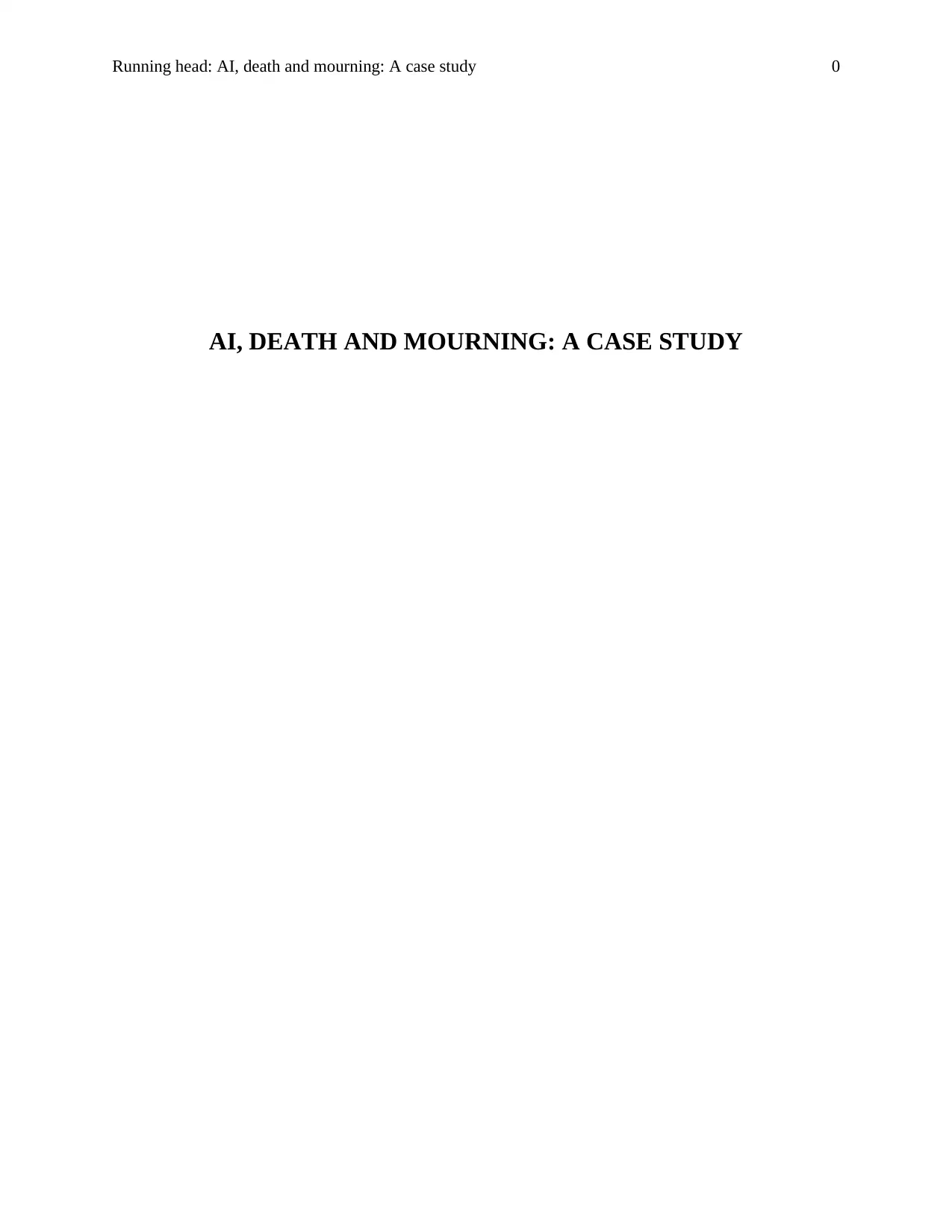
Running head: AI, death and mourning: A case study 0
AI, DEATH AND MOURNING: A CASE STUDY
AI, DEATH AND MOURNING: A CASE STUDY
Paraphrase This Document
Need a fresh take? Get an instant paraphrase of this document with our AI Paraphraser
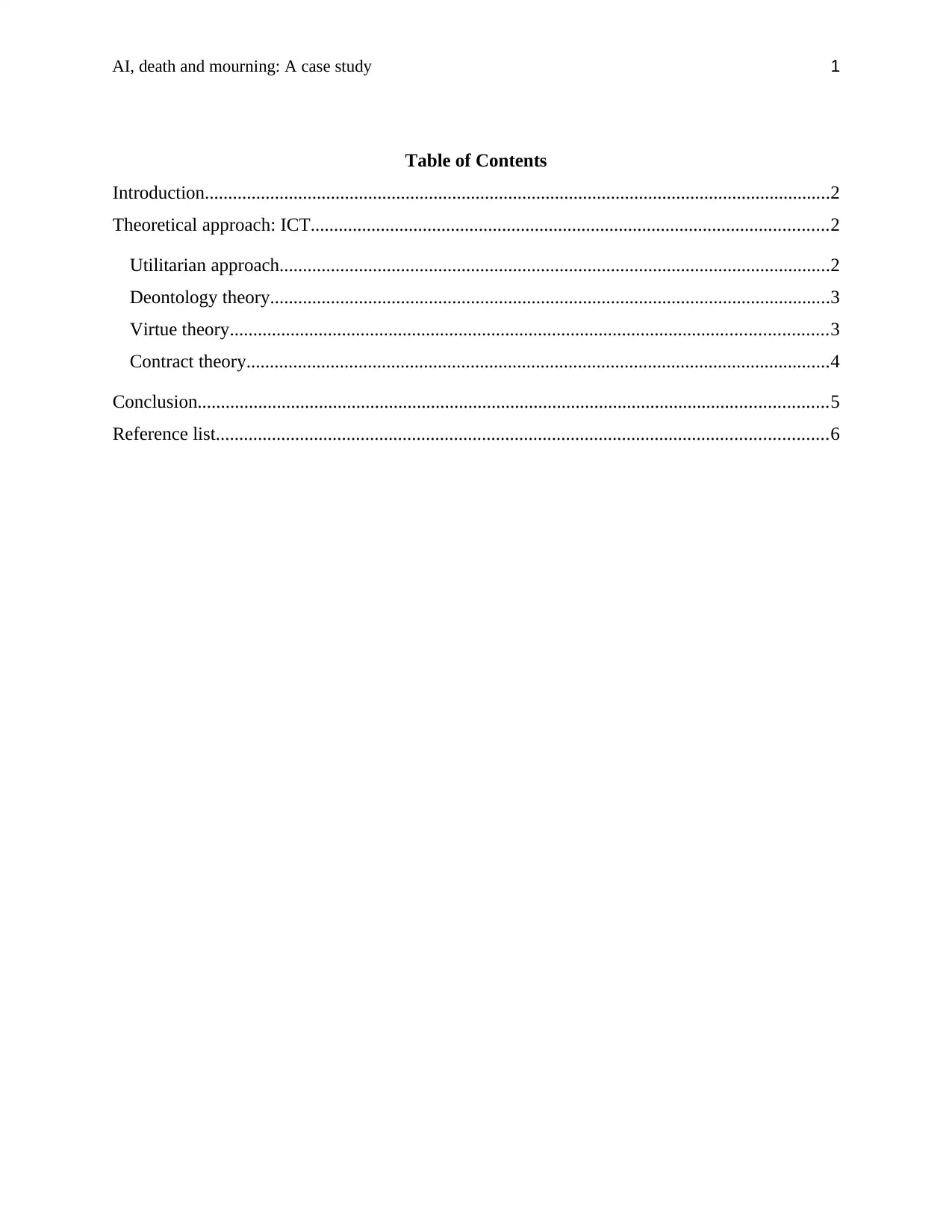
AI, death and mourning: A case study 1
Table of Contents
Introduction......................................................................................................................................2
Theoretical approach: ICT...............................................................................................................2
Utilitarian approach......................................................................................................................2
Deontology theory........................................................................................................................3
Virtue theory................................................................................................................................3
Contract theory.............................................................................................................................4
Conclusion.......................................................................................................................................5
Reference list...................................................................................................................................6
Table of Contents
Introduction......................................................................................................................................2
Theoretical approach: ICT...............................................................................................................2
Utilitarian approach......................................................................................................................2
Deontology theory........................................................................................................................3
Virtue theory................................................................................................................................3
Contract theory.............................................................................................................................4
Conclusion.......................................................................................................................................5
Reference list...................................................................................................................................6
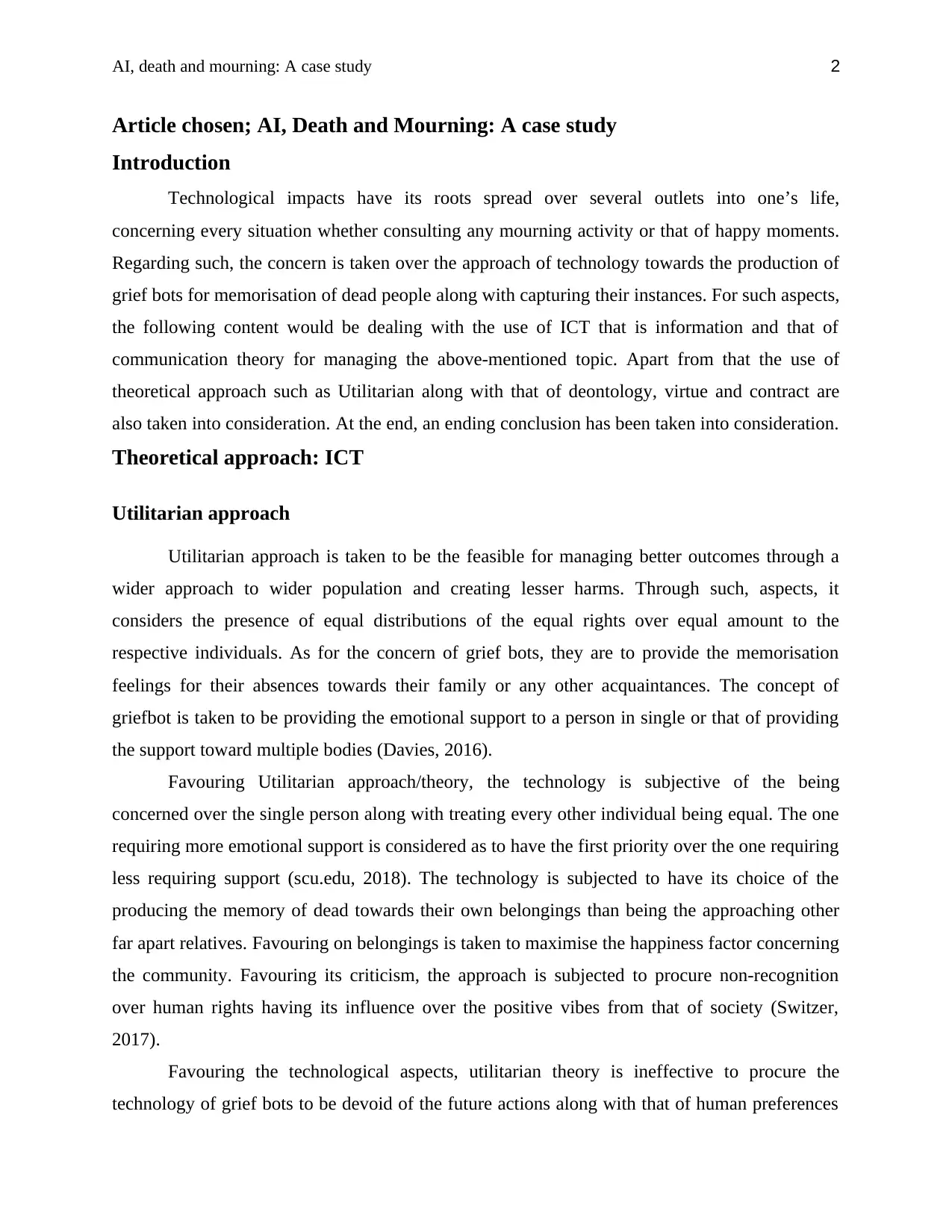
AI, death and mourning: A case study 2
Article chosen; AI, Death and Mourning: A case study
Introduction
Technological impacts have its roots spread over several outlets into one’s life,
concerning every situation whether consulting any mourning activity or that of happy moments.
Regarding such, the concern is taken over the approach of technology towards the production of
grief bots for memorisation of dead people along with capturing their instances. For such aspects,
the following content would be dealing with the use of ICT that is information and that of
communication theory for managing the above-mentioned topic. Apart from that the use of
theoretical approach such as Utilitarian along with that of deontology, virtue and contract are
also taken into consideration. At the end, an ending conclusion has been taken into consideration.
Theoretical approach: ICT
Utilitarian approach
Utilitarian approach is taken to be the feasible for managing better outcomes through a
wider approach to wider population and creating lesser harms. Through such, aspects, it
considers the presence of equal distributions of the equal rights over equal amount to the
respective individuals. As for the concern of grief bots, they are to provide the memorisation
feelings for their absences towards their family or any other acquaintances. The concept of
griefbot is taken to be providing the emotional support to a person in single or that of providing
the support toward multiple bodies (Davies, 2016).
Favouring Utilitarian approach/theory, the technology is subjective of the being
concerned over the single person along with treating every other individual being equal. The one
requiring more emotional support is considered as to have the first priority over the one requiring
less requiring support (scu.edu, 2018). The technology is subjected to have its choice of the
producing the memory of dead towards their own belongings than being the approaching other
far apart relatives. Favouring on belongings is taken to maximise the happiness factor concerning
the community. Favouring its criticism, the approach is subjected to procure non-recognition
over human rights having its influence over the positive vibes from that of society (Switzer,
2017).
Favouring the technological aspects, utilitarian theory is ineffective to procure the
technology of grief bots to be devoid of the future actions along with that of human preferences
Article chosen; AI, Death and Mourning: A case study
Introduction
Technological impacts have its roots spread over several outlets into one’s life,
concerning every situation whether consulting any mourning activity or that of happy moments.
Regarding such, the concern is taken over the approach of technology towards the production of
grief bots for memorisation of dead people along with capturing their instances. For such aspects,
the following content would be dealing with the use of ICT that is information and that of
communication theory for managing the above-mentioned topic. Apart from that the use of
theoretical approach such as Utilitarian along with that of deontology, virtue and contract are
also taken into consideration. At the end, an ending conclusion has been taken into consideration.
Theoretical approach: ICT
Utilitarian approach
Utilitarian approach is taken to be the feasible for managing better outcomes through a
wider approach to wider population and creating lesser harms. Through such, aspects, it
considers the presence of equal distributions of the equal rights over equal amount to the
respective individuals. As for the concern of grief bots, they are to provide the memorisation
feelings for their absences towards their family or any other acquaintances. The concept of
griefbot is taken to be providing the emotional support to a person in single or that of providing
the support toward multiple bodies (Davies, 2016).
Favouring Utilitarian approach/theory, the technology is subjective of the being
concerned over the single person along with treating every other individual being equal. The one
requiring more emotional support is considered as to have the first priority over the one requiring
less requiring support (scu.edu, 2018). The technology is subjected to have its choice of the
producing the memory of dead towards their own belongings than being the approaching other
far apart relatives. Favouring on belongings is taken to maximise the happiness factor concerning
the community. Favouring its criticism, the approach is subjected to procure non-recognition
over human rights having its influence over the positive vibes from that of society (Switzer,
2017).
Favouring the technological aspects, utilitarian theory is ineffective to procure the
technology of grief bots to be devoid of the future actions along with that of human preferences
⊘ This is a preview!⊘
Do you want full access?
Subscribe today to unlock all pages.

Trusted by 1+ million students worldwide
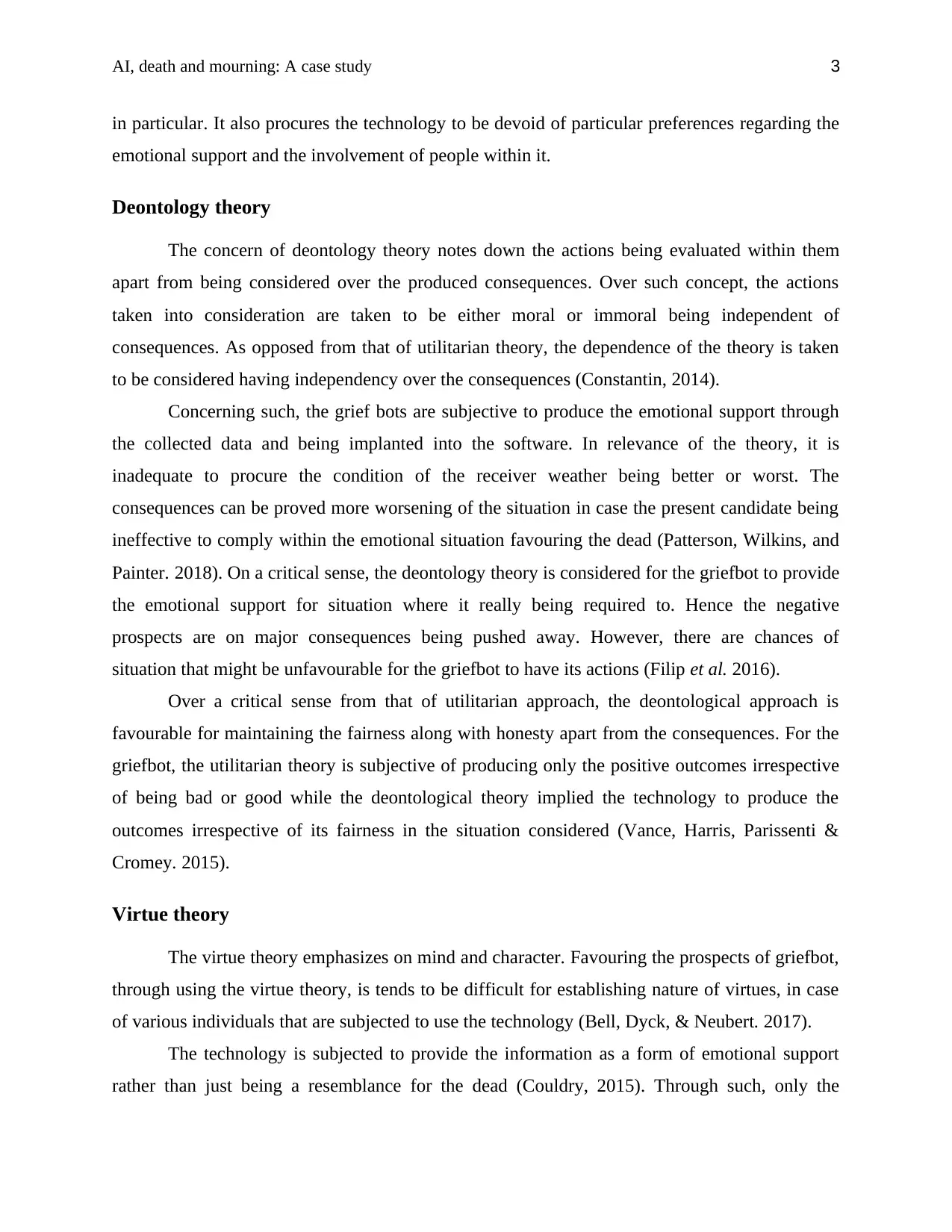
AI, death and mourning: A case study 3
in particular. It also procures the technology to be devoid of particular preferences regarding the
emotional support and the involvement of people within it.
Deontology theory
The concern of deontology theory notes down the actions being evaluated within them
apart from being considered over the produced consequences. Over such concept, the actions
taken into consideration are taken to be either moral or immoral being independent of
consequences. As opposed from that of utilitarian theory, the dependence of the theory is taken
to be considered having independency over the consequences (Constantin, 2014).
Concerning such, the grief bots are subjective to produce the emotional support through
the collected data and being implanted into the software. In relevance of the theory, it is
inadequate to procure the condition of the receiver weather being better or worst. The
consequences can be proved more worsening of the situation in case the present candidate being
ineffective to comply within the emotional situation favouring the dead (Patterson, Wilkins, and
Painter. 2018). On a critical sense, the deontology theory is considered for the griefbot to provide
the emotional support for situation where it really being required to. Hence the negative
prospects are on major consequences being pushed away. However, there are chances of
situation that might be unfavourable for the griefbot to have its actions (Filip et al. 2016).
Over a critical sense from that of utilitarian approach, the deontological approach is
favourable for maintaining the fairness along with honesty apart from the consequences. For the
griefbot, the utilitarian theory is subjective of producing only the positive outcomes irrespective
of being bad or good while the deontological theory implied the technology to produce the
outcomes irrespective of its fairness in the situation considered (Vance, Harris, Parissenti &
Cromey. 2015).
Virtue theory
The virtue theory emphasizes on mind and character. Favouring the prospects of griefbot,
through using the virtue theory, is tends to be difficult for establishing nature of virtues, in case
of various individuals that are subjected to use the technology (Bell, Dyck, & Neubert. 2017).
The technology is subjected to provide the information as a form of emotional support
rather than just being a resemblance for the dead (Couldry, 2015). Through such, only the
in particular. It also procures the technology to be devoid of particular preferences regarding the
emotional support and the involvement of people within it.
Deontology theory
The concern of deontology theory notes down the actions being evaluated within them
apart from being considered over the produced consequences. Over such concept, the actions
taken into consideration are taken to be either moral or immoral being independent of
consequences. As opposed from that of utilitarian theory, the dependence of the theory is taken
to be considered having independency over the consequences (Constantin, 2014).
Concerning such, the grief bots are subjective to produce the emotional support through
the collected data and being implanted into the software. In relevance of the theory, it is
inadequate to procure the condition of the receiver weather being better or worst. The
consequences can be proved more worsening of the situation in case the present candidate being
ineffective to comply within the emotional situation favouring the dead (Patterson, Wilkins, and
Painter. 2018). On a critical sense, the deontology theory is considered for the griefbot to provide
the emotional support for situation where it really being required to. Hence the negative
prospects are on major consequences being pushed away. However, there are chances of
situation that might be unfavourable for the griefbot to have its actions (Filip et al. 2016).
Over a critical sense from that of utilitarian approach, the deontological approach is
favourable for maintaining the fairness along with honesty apart from the consequences. For the
griefbot, the utilitarian theory is subjective of producing only the positive outcomes irrespective
of being bad or good while the deontological theory implied the technology to produce the
outcomes irrespective of its fairness in the situation considered (Vance, Harris, Parissenti &
Cromey. 2015).
Virtue theory
The virtue theory emphasizes on mind and character. Favouring the prospects of griefbot,
through using the virtue theory, is tends to be difficult for establishing nature of virtues, in case
of various individuals that are subjected to use the technology (Bell, Dyck, & Neubert. 2017).
The technology is subjected to provide the information as a form of emotional support
rather than just being a resemblance for the dead (Couldry, 2015). Through such, only the
Paraphrase This Document
Need a fresh take? Get an instant paraphrase of this document with our AI Paraphraser
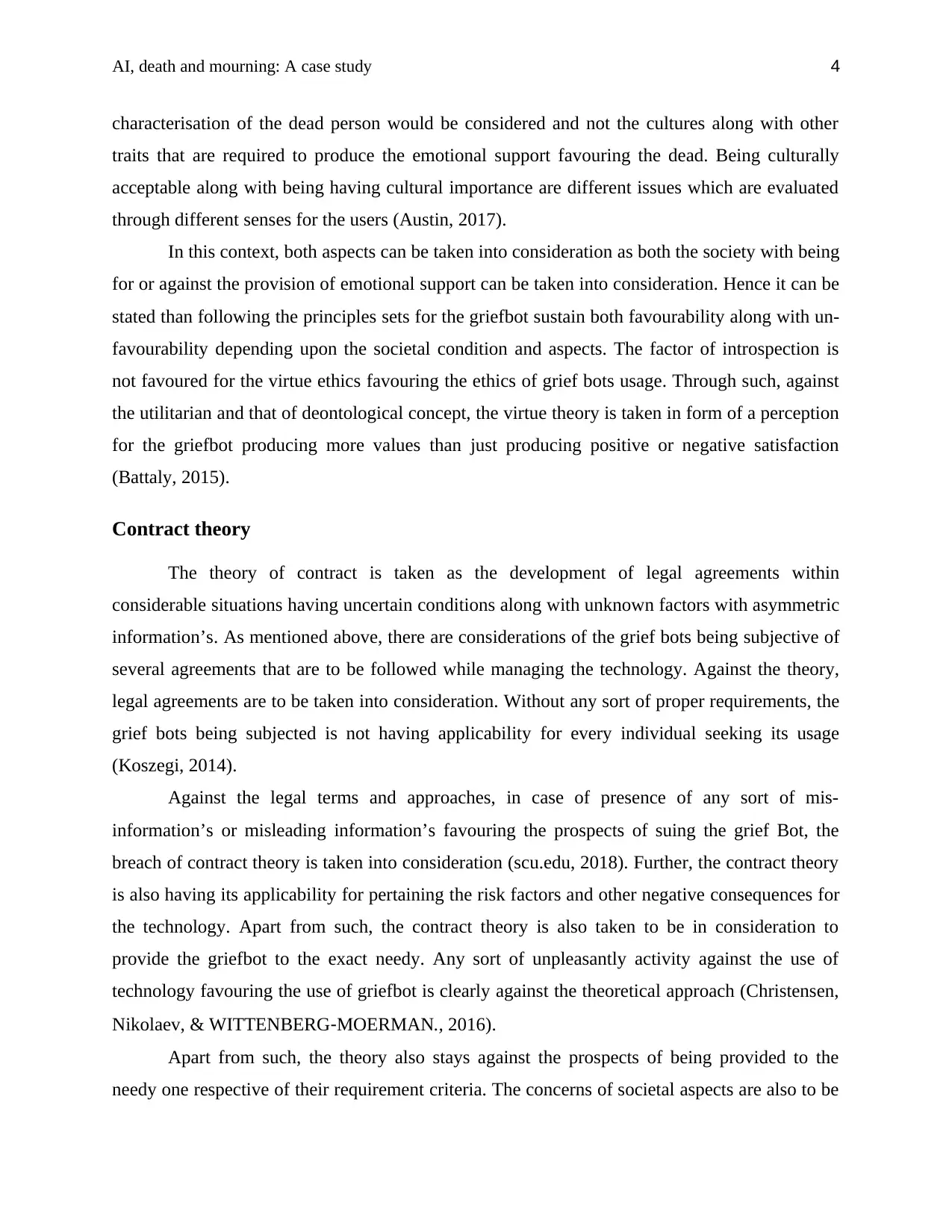
AI, death and mourning: A case study 4
characterisation of the dead person would be considered and not the cultures along with other
traits that are required to produce the emotional support favouring the dead. Being culturally
acceptable along with being having cultural importance are different issues which are evaluated
through different senses for the users (Austin, 2017).
In this context, both aspects can be taken into consideration as both the society with being
for or against the provision of emotional support can be taken into consideration. Hence it can be
stated than following the principles sets for the griefbot sustain both favourability along with un-
favourability depending upon the societal condition and aspects. The factor of introspection is
not favoured for the virtue ethics favouring the ethics of grief bots usage. Through such, against
the utilitarian and that of deontological concept, the virtue theory is taken in form of a perception
for the griefbot producing more values than just producing positive or negative satisfaction
(Battaly, 2015).
Contract theory
The theory of contract is taken as the development of legal agreements within
considerable situations having uncertain conditions along with unknown factors with asymmetric
information’s. As mentioned above, there are considerations of the grief bots being subjective of
several agreements that are to be followed while managing the technology. Against the theory,
legal agreements are to be taken into consideration. Without any sort of proper requirements, the
grief bots being subjected is not having applicability for every individual seeking its usage
(Koszegi, 2014).
Against the legal terms and approaches, in case of presence of any sort of mis-
information’s or misleading information’s favouring the prospects of suing the grief Bot, the
breach of contract theory is taken into consideration (scu.edu, 2018). Further, the contract theory
is also having its applicability for pertaining the risk factors and other negative consequences for
the technology. Apart from such, the contract theory is also taken to be in consideration to
provide the griefbot to the exact needy. Any sort of unpleasantly activity against the use of
technology favouring the use of griefbot is clearly against the theoretical approach (Christensen,
Nikolaev, & WITTENBERG‐MOERMAN., 2016).
Apart from such, the theory also stays against the prospects of being provided to the
needy one respective of their requirement criteria. The concerns of societal aspects are also to be
characterisation of the dead person would be considered and not the cultures along with other
traits that are required to produce the emotional support favouring the dead. Being culturally
acceptable along with being having cultural importance are different issues which are evaluated
through different senses for the users (Austin, 2017).
In this context, both aspects can be taken into consideration as both the society with being
for or against the provision of emotional support can be taken into consideration. Hence it can be
stated than following the principles sets for the griefbot sustain both favourability along with un-
favourability depending upon the societal condition and aspects. The factor of introspection is
not favoured for the virtue ethics favouring the ethics of grief bots usage. Through such, against
the utilitarian and that of deontological concept, the virtue theory is taken in form of a perception
for the griefbot producing more values than just producing positive or negative satisfaction
(Battaly, 2015).
Contract theory
The theory of contract is taken as the development of legal agreements within
considerable situations having uncertain conditions along with unknown factors with asymmetric
information’s. As mentioned above, there are considerations of the grief bots being subjective of
several agreements that are to be followed while managing the technology. Against the theory,
legal agreements are to be taken into consideration. Without any sort of proper requirements, the
grief bots being subjected is not having applicability for every individual seeking its usage
(Koszegi, 2014).
Against the legal terms and approaches, in case of presence of any sort of mis-
information’s or misleading information’s favouring the prospects of suing the grief Bot, the
breach of contract theory is taken into consideration (scu.edu, 2018). Further, the contract theory
is also having its applicability for pertaining the risk factors and other negative consequences for
the technology. Apart from such, the contract theory is also taken to be in consideration to
provide the griefbot to the exact needy. Any sort of unpleasantly activity against the use of
technology favouring the use of griefbot is clearly against the theoretical approach (Christensen,
Nikolaev, & WITTENBERG‐MOERMAN., 2016).
Apart from such, the theory also stays against the prospects of being provided to the
needy one respective of their requirement criteria. The concerns of societal aspects are also to be
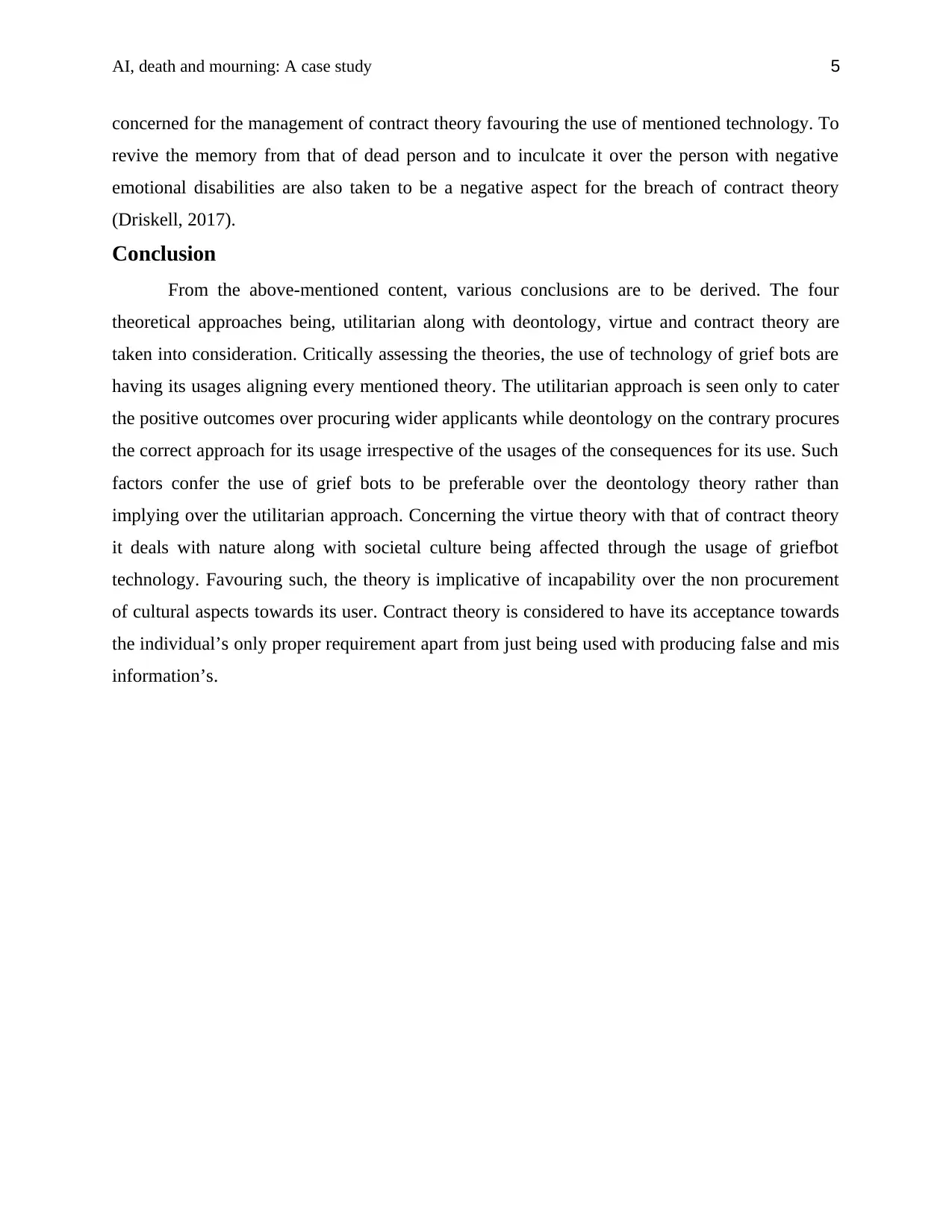
AI, death and mourning: A case study 5
concerned for the management of contract theory favouring the use of mentioned technology. To
revive the memory from that of dead person and to inculcate it over the person with negative
emotional disabilities are also taken to be a negative aspect for the breach of contract theory
(Driskell, 2017).
Conclusion
From the above-mentioned content, various conclusions are to be derived. The four
theoretical approaches being, utilitarian along with deontology, virtue and contract theory are
taken into consideration. Critically assessing the theories, the use of technology of grief bots are
having its usages aligning every mentioned theory. The utilitarian approach is seen only to cater
the positive outcomes over procuring wider applicants while deontology on the contrary procures
the correct approach for its usage irrespective of the usages of the consequences for its use. Such
factors confer the use of grief bots to be preferable over the deontology theory rather than
implying over the utilitarian approach. Concerning the virtue theory with that of contract theory
it deals with nature along with societal culture being affected through the usage of griefbot
technology. Favouring such, the theory is implicative of incapability over the non procurement
of cultural aspects towards its user. Contract theory is considered to have its acceptance towards
the individual’s only proper requirement apart from just being used with producing false and mis
information’s.
concerned for the management of contract theory favouring the use of mentioned technology. To
revive the memory from that of dead person and to inculcate it over the person with negative
emotional disabilities are also taken to be a negative aspect for the breach of contract theory
(Driskell, 2017).
Conclusion
From the above-mentioned content, various conclusions are to be derived. The four
theoretical approaches being, utilitarian along with deontology, virtue and contract theory are
taken into consideration. Critically assessing the theories, the use of technology of grief bots are
having its usages aligning every mentioned theory. The utilitarian approach is seen only to cater
the positive outcomes over procuring wider applicants while deontology on the contrary procures
the correct approach for its usage irrespective of the usages of the consequences for its use. Such
factors confer the use of grief bots to be preferable over the deontology theory rather than
implying over the utilitarian approach. Concerning the virtue theory with that of contract theory
it deals with nature along with societal culture being affected through the usage of griefbot
technology. Favouring such, the theory is implicative of incapability over the non procurement
of cultural aspects towards its user. Contract theory is considered to have its acceptance towards
the individual’s only proper requirement apart from just being used with producing false and mis
information’s.
⊘ This is a preview!⊘
Do you want full access?
Subscribe today to unlock all pages.

Trusted by 1+ million students worldwide
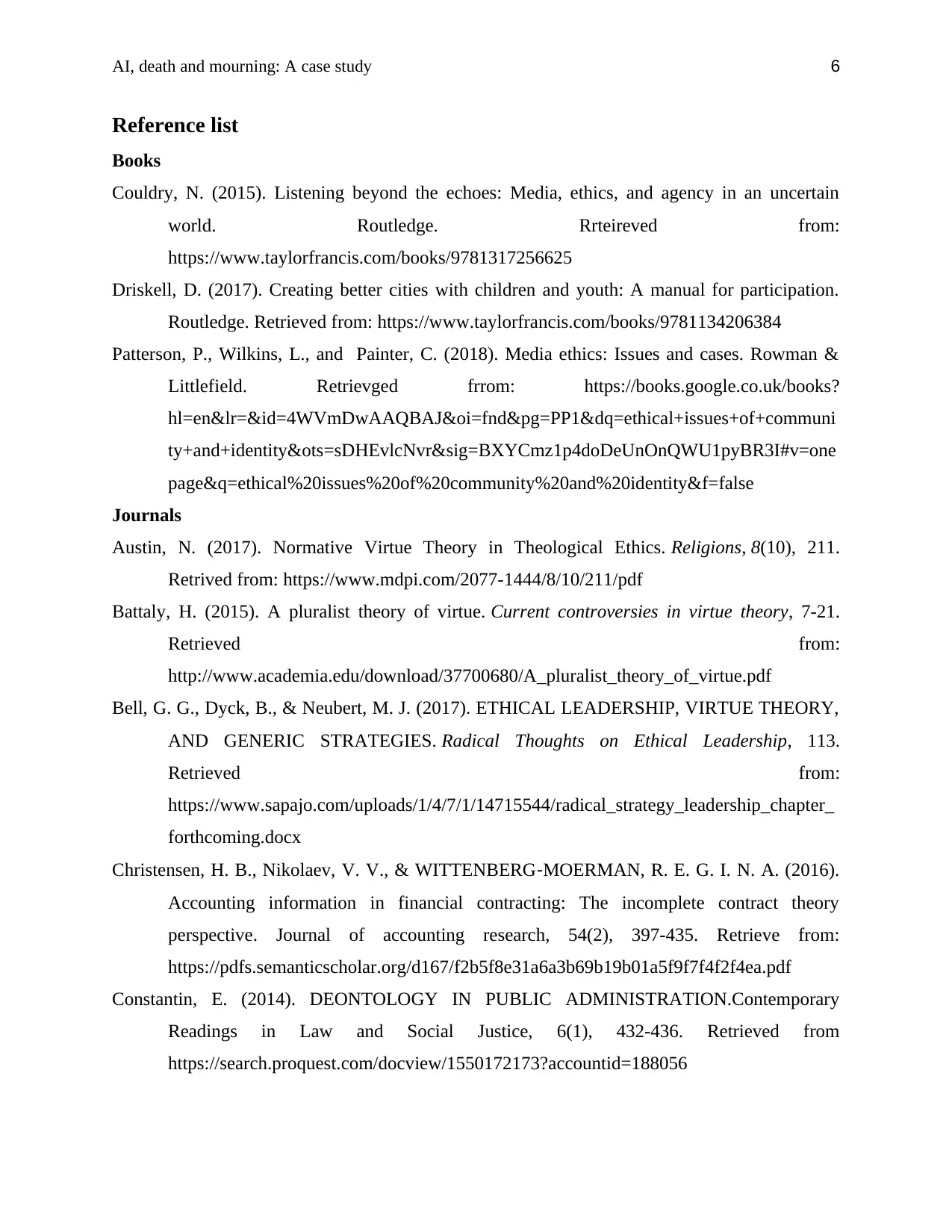
AI, death and mourning: A case study 6
Reference list
Books
Couldry, N. (2015). Listening beyond the echoes: Media, ethics, and agency in an uncertain
world. Routledge. Rrteireved from:
https://www.taylorfrancis.com/books/9781317256625
Driskell, D. (2017). Creating better cities with children and youth: A manual for participation.
Routledge. Retrieved from: https://www.taylorfrancis.com/books/9781134206384
Patterson, P., Wilkins, L., and Painter, C. (2018). Media ethics: Issues and cases. Rowman &
Littlefield. Retrievged frrom: https://books.google.co.uk/books?
hl=en&lr=&id=4WVmDwAAQBAJ&oi=fnd&pg=PP1&dq=ethical+issues+of+communi
ty+and+identity&ots=sDHEvlcNvr&sig=BXYCmz1p4doDeUnOnQWU1pyBR3I#v=one
page&q=ethical%20issues%20of%20community%20and%20identity&f=false
Journals
Austin, N. (2017). Normative Virtue Theory in Theological Ethics. Religions, 8(10), 211.
Retrived from: https://www.mdpi.com/2077-1444/8/10/211/pdf
Battaly, H. (2015). A pluralist theory of virtue. Current controversies in virtue theory, 7-21.
Retrieved from:
http://www.academia.edu/download/37700680/A_pluralist_theory_of_virtue.pdf
Bell, G. G., Dyck, B., & Neubert, M. J. (2017). ETHICAL LEADERSHIP, VIRTUE THEORY,
AND GENERIC STRATEGIES. Radical Thoughts on Ethical Leadership, 113.
Retrieved from:
https://www.sapajo.com/uploads/1/4/7/1/14715544/radical_strategy_leadership_chapter_
forthcoming.docx
Christensen, H. B., Nikolaev, V. V., & WITTENBERG‐MOERMAN, R. E. G. I. N. A. (2016).
Accounting information in financial contracting: The incomplete contract theory
perspective. Journal of accounting research, 54(2), 397-435. Retrieve from:
https://pdfs.semanticscholar.org/d167/f2b5f8e31a6a3b69b19b01a5f9f7f4f2f4ea.pdf
Constantin, E. (2014). DEONTOLOGY IN PUBLIC ADMINISTRATION.Contemporary
Readings in Law and Social Justice, 6(1), 432-436. Retrieved from
https://search.proquest.com/docview/1550172173?accountid=188056
Reference list
Books
Couldry, N. (2015). Listening beyond the echoes: Media, ethics, and agency in an uncertain
world. Routledge. Rrteireved from:
https://www.taylorfrancis.com/books/9781317256625
Driskell, D. (2017). Creating better cities with children and youth: A manual for participation.
Routledge. Retrieved from: https://www.taylorfrancis.com/books/9781134206384
Patterson, P., Wilkins, L., and Painter, C. (2018). Media ethics: Issues and cases. Rowman &
Littlefield. Retrievged frrom: https://books.google.co.uk/books?
hl=en&lr=&id=4WVmDwAAQBAJ&oi=fnd&pg=PP1&dq=ethical+issues+of+communi
ty+and+identity&ots=sDHEvlcNvr&sig=BXYCmz1p4doDeUnOnQWU1pyBR3I#v=one
page&q=ethical%20issues%20of%20community%20and%20identity&f=false
Journals
Austin, N. (2017). Normative Virtue Theory in Theological Ethics. Religions, 8(10), 211.
Retrived from: https://www.mdpi.com/2077-1444/8/10/211/pdf
Battaly, H. (2015). A pluralist theory of virtue. Current controversies in virtue theory, 7-21.
Retrieved from:
http://www.academia.edu/download/37700680/A_pluralist_theory_of_virtue.pdf
Bell, G. G., Dyck, B., & Neubert, M. J. (2017). ETHICAL LEADERSHIP, VIRTUE THEORY,
AND GENERIC STRATEGIES. Radical Thoughts on Ethical Leadership, 113.
Retrieved from:
https://www.sapajo.com/uploads/1/4/7/1/14715544/radical_strategy_leadership_chapter_
forthcoming.docx
Christensen, H. B., Nikolaev, V. V., & WITTENBERG‐MOERMAN, R. E. G. I. N. A. (2016).
Accounting information in financial contracting: The incomplete contract theory
perspective. Journal of accounting research, 54(2), 397-435. Retrieve from:
https://pdfs.semanticscholar.org/d167/f2b5f8e31a6a3b69b19b01a5f9f7f4f2f4ea.pdf
Constantin, E. (2014). DEONTOLOGY IN PUBLIC ADMINISTRATION.Contemporary
Readings in Law and Social Justice, 6(1), 432-436. Retrieved from
https://search.proquest.com/docview/1550172173?accountid=188056
Paraphrase This Document
Need a fresh take? Get an instant paraphrase of this document with our AI Paraphraser
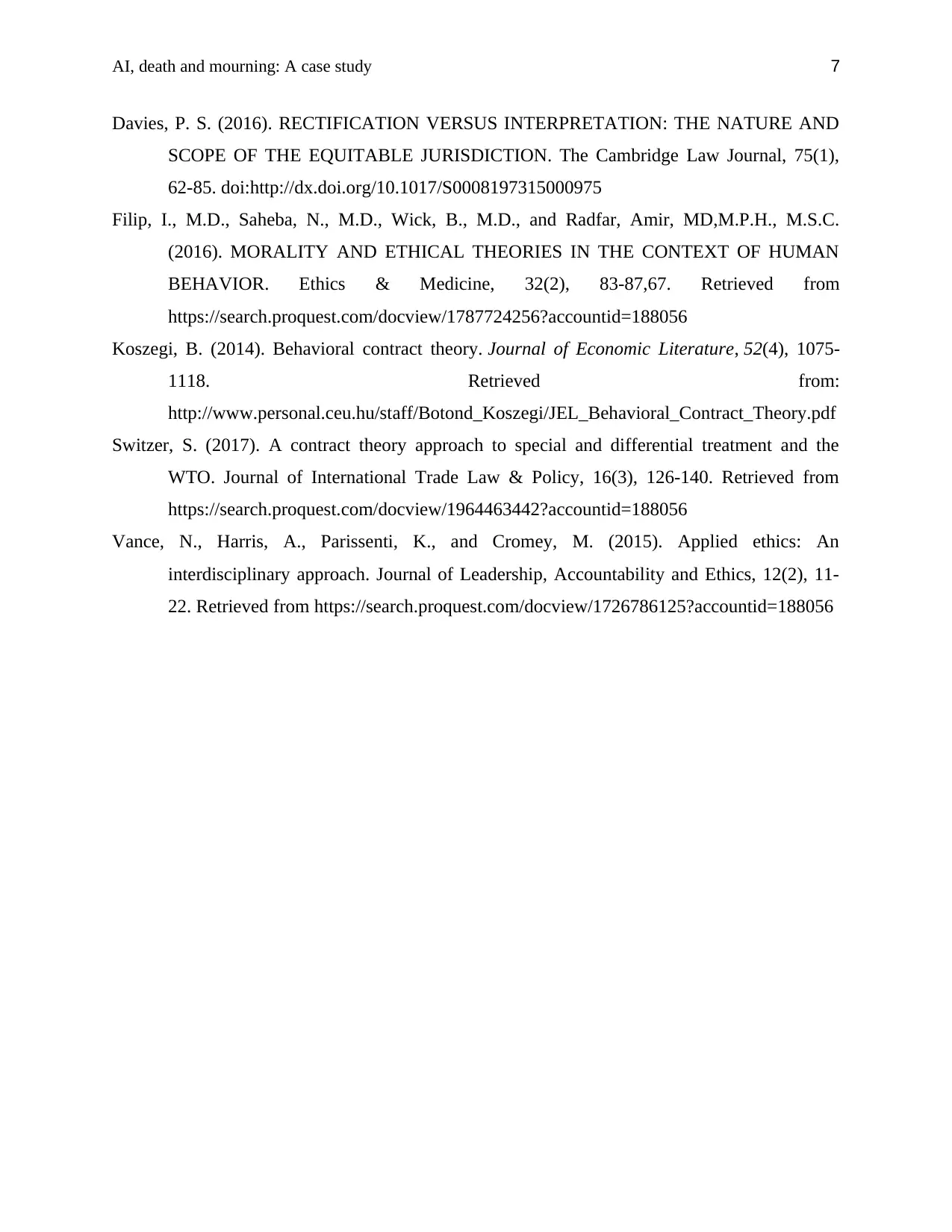
AI, death and mourning: A case study 7
Davies, P. S. (2016). RECTIFICATION VERSUS INTERPRETATION: THE NATURE AND
SCOPE OF THE EQUITABLE JURISDICTION. The Cambridge Law Journal, 75(1),
62-85. doi:http://dx.doi.org/10.1017/S0008197315000975
Filip, I., M.D., Saheba, N., M.D., Wick, B., M.D., and Radfar, Amir, MD,M.P.H., M.S.C.
(2016). MORALITY AND ETHICAL THEORIES IN THE CONTEXT OF HUMAN
BEHAVIOR. Ethics & Medicine, 32(2), 83-87,67. Retrieved from
https://search.proquest.com/docview/1787724256?accountid=188056
Koszegi, B. (2014). Behavioral contract theory. Journal of Economic Literature, 52(4), 1075-
1118. Retrieved from:
http://www.personal.ceu.hu/staff/Botond_Koszegi/JEL_Behavioral_Contract_Theory.pdf
Switzer, S. (2017). A contract theory approach to special and differential treatment and the
WTO. Journal of International Trade Law & Policy, 16(3), 126-140. Retrieved from
https://search.proquest.com/docview/1964463442?accountid=188056
Vance, N., Harris, A., Parissenti, K., and Cromey, M. (2015). Applied ethics: An
interdisciplinary approach. Journal of Leadership, Accountability and Ethics, 12(2), 11-
22. Retrieved from https://search.proquest.com/docview/1726786125?accountid=188056
Davies, P. S. (2016). RECTIFICATION VERSUS INTERPRETATION: THE NATURE AND
SCOPE OF THE EQUITABLE JURISDICTION. The Cambridge Law Journal, 75(1),
62-85. doi:http://dx.doi.org/10.1017/S0008197315000975
Filip, I., M.D., Saheba, N., M.D., Wick, B., M.D., and Radfar, Amir, MD,M.P.H., M.S.C.
(2016). MORALITY AND ETHICAL THEORIES IN THE CONTEXT OF HUMAN
BEHAVIOR. Ethics & Medicine, 32(2), 83-87,67. Retrieved from
https://search.proquest.com/docview/1787724256?accountid=188056
Koszegi, B. (2014). Behavioral contract theory. Journal of Economic Literature, 52(4), 1075-
1118. Retrieved from:
http://www.personal.ceu.hu/staff/Botond_Koszegi/JEL_Behavioral_Contract_Theory.pdf
Switzer, S. (2017). A contract theory approach to special and differential treatment and the
WTO. Journal of International Trade Law & Policy, 16(3), 126-140. Retrieved from
https://search.proquest.com/docview/1964463442?accountid=188056
Vance, N., Harris, A., Parissenti, K., and Cromey, M. (2015). Applied ethics: An
interdisciplinary approach. Journal of Leadership, Accountability and Ethics, 12(2), 11-
22. Retrieved from https://search.proquest.com/docview/1726786125?accountid=188056
1 out of 8
Related Documents
Your All-in-One AI-Powered Toolkit for Academic Success.
+13062052269
info@desklib.com
Available 24*7 on WhatsApp / Email
![[object Object]](/_next/static/media/star-bottom.7253800d.svg)
Unlock your academic potential
Copyright © 2020–2026 A2Z Services. All Rights Reserved. Developed and managed by ZUCOL.



